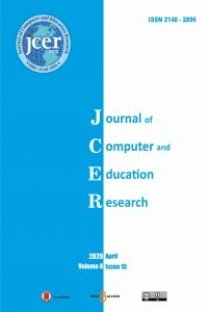A Meta-Synthesis Study: An Investigation of Studies on EFL Teachers’ Technological Pedagogical Content Knowledge (TPACK) Competencies in Turkey
In-service EFL teachers, prospective EFL teachers, TPACK, a qualitative analysis
A Meta-Synthesis Study: An Investigation of Studies on EFL Teachers’ Technological Pedagogical Content Knowledge (TPACK) Competencies in Turkey
___
- Arslan, A. (2021). Meta-synthetic review of studies on EFL teachers’ TPACK in Turkey. Current Academic Studies in Educational Sciences, 259-284
- Baran, E., & Uygun, E. (2016). Putting technological, pedagogical, and content knowledge (TPACK) in action: An integrated TPACK-design-based learning (DBL) approach. Australasian Journal of Educational Technology, 32(2), 47-63.
- Battelle for Kids (2019). Framework for 21st-century learning. https://www.battelleforkids.org/networks/p21 Bilgiç, H. G, Duman, D., & Seferoğlu, S. S. (2011). The characteristics of digital natives and their effects on the design of online environments. İnönü University Academic Informatics 2(4), 1-7.
- Cabi, E. (2015). The comparison of academic locus of control and the perceptions of self-efficacy of teacher candidates. International Journal of Innovative Research in Education 2(1), 10-15.
- Çalık, M., & Sözbilir, M. (2014). Parameters of content analysis. Education and Science, 39(174), 33-38.
- Cox, S. (2008). A conceptual analysis of technological pedagogical content knowledge. (Unpublished doctoral dissertation). Brigham Young University, Utah.
- Dinçer, S. (2018). Content analysis in scientific research: Meta-analysis, meta-synthesis, and descriptive content analysis. Bartın University Journal of Faculty of Education, 7(1), 176-190.
- Dikmen, C., & Demirer, V. (2016). Trends in studies on technological pedagogical content knowledge in Turkey between 2009 and 2013 years. Turkish Journal of Education, 5(1), 33-46.
- Ekmekçi, E. (2018). Examination of studies regarding pre-service EFL teachers’ technological pedagogical content knowledge (TPACK) in Turkey, International Journal of Eurasia Social Sciences, 9(34), 2180-2193.
- Gao, P., Choy, D., Wong, A. F. L., & Wu, J. (2009). Developing a better understanding of technology-based pedagogy. Australasian Journal of Educational Technology, 25(5), 714-730.
- Göksu, İ., Özcan, K. V., Çakır, R. & Göktaş, Y. (2014). Studies related to instructional design models in Turkey. Elementary Education Online, 13(2), 694-709.
- Kaçar, I. G. (2022). Pre-service EFL teachers as digital material designers: a case study into the TPACK development in the Turkish context. Teaching English with Technology, 22(3/4), 107-130.
- Koehler, M.J., & Mishra, P. (2008). Introducing TPCK. In AACTE committee on innovation and technology (Ed.), The handbook of technological pedagogical content knowledge (TPCK) for educators (pp. 3-29). Mahwah, NJ: Lawrence Erlbaum Associates.
- Koehler, M. J., & Mishra, P. (2009). What is technological pedagogical content knowledge? Contemporary Issues in Technology and Teacher Education, 9(1), 60-70.
- Koehler, M. J., Mishra, P., Kereluik, K., Shin, T.S., & Graham, C. (2013). The technological pedagogical content knowledge framework. In M. J. Spector, M. D. Merrill, J. Elen & M. J. Bishop (Eds.), Handbook of research on educational communications and technology (pp. 101-111). New York: Springer.
- Konan, N. (2010). Computer literacy levels of teachers. Procedia: Social and Behavioral Sciences, 2(2), 2567–2571. https://doi.org/10.1016/j.sbspro.2010.03.374 Lee, M. H., & Tsai, C. C. (2010). Exploring teachers' perceived self-efficacy and technological pedagogical content knowledge with respect to educational use of the world wide web. Instructional Science: An International Journal of the Learning Sciences, 38(1), 1-21
- Lim, C. P., & Khine, M. (2006). Managing teachers’ barriers to ICT integration in Singapore schools. Journal of Technology and Teacher Education, 14(1), 97-125.
- Miles, M. B., & Huberman, A. M. (1994). Qualitative data analysis: An expanded sourcebook. Second Edition. California: Sage Publications.
- Mishra, P., & Koehler, M. J. (2006). Technological pedagogical content knowledge: A framework for teacher knowledge. Teachers College Record, 108(6), 1017- 1054.
- Pamuk, S. Çakır, R. Ergun, M. Yılmaz, H.B. & Ayas, C. (2013). The use of tablet pc and interactive board from the perspectives of teachers and students: evaluation of the FATİH project. Educational Sciences: Theory & Practice, 13(3), 1799-1822.
- Rahimi, M., & Pourshahbaz, S. (Eds.). (2018). English as a foreign language teachers' TPACK: Emerging research and opportunities. USA: IGI Global.
- Niess, M. L. (2005). Preparing teachers to teach science and mathematics with technology: Developing a technology pedagogical content knowledge. Teaching and Teacher Education, 21(5), 509-523.
- Prensky, M. (2001). Digital natives, digital immigrants. On the Horizon 9(5), 1-6.
- Shapka, J. D., & Ferrari, M. (2003). Computer-related attitudes and actions of teacher candidates. Computers in Human Behavior, 19(3), 319-334.
- Schmidt, D. A., Baran, E., Thompson, A. D., Mishra, P., Koehler, M. J., & Shin, T. S. (2009). Technological pedagogical content knowledge (TPACK) the development and validation of an assessment instrument for preservice teachers. Journal of Research on Technology in Education, 42(2), 123-149.
- Schreiber, R., Crooks, D., & Stern, P. N. (1997). Qualitative meta-analysis. In J. M. Morse (Ed.), Completing a qualitative project (pp. 311–326). Thousand Oaks, CA: Sage
- Shulman, L. S. (1986). Those who understand: Knowledge growth in teaching. Educational Researcher, 15(2), 4-14.
- Strobel, J. & Van Barneveld, A. (2009). When is PBL more effective? A meta-synthesis of meta-analyses comparing PBL to conventional classrooms. Interdisciplinary Journal of Problem-based Learning, 3(1), 44-58.
- Usta, E. & Korkmaz, Ö. (2010). Pre-service teachers’ computer competencies, perception of technology use and attitudes toward teaching career. Uluslararası İnsan Bilimleri Dergisi, 7(1), 1335-1349.
- Trilling, B., & Fadel, C. (2009). 21st-century skills: Learning for life in our times. San Francisco, CA: Jossey-Bass
- Wu, Y.-T. (2013). Research trends in technological pedagogical content knowledge (TPACK) research: A review of empirical studies published in selected journals from 2002 to 2011. British Journal of Educational Technology 44 (3) 73-76.
- Yıldız, B. (2020). Exploring the predictive power of in-service EFL instructors’ informal technology usage situations on their TPACK levels. (Unpublished M.A. thesis). Bahçeşehir University, İstanbul.
- Yayın Aralığı: 2
- Başlangıç: 2013
- Yayıncı: Tamer KUTLUCA
Faruk KORKMAZ, Mihriban HACISALİHOĞLU KARADENİZ
Secondary School Teachers' Self-Efficacy Beliefs Regarding Information Technology
Özge ÖZTUZCU, Zeynel Abidin MISIRLI
Ümit DURUK, Emine ÇAVUŞ, Abuzer AKGÜN
Didactic Praxeologies Employed by Mathematics Teachers in Teaching the Inverse Function
Mustafa GÖK, Abdulkadir ERDOĞAN
Fen Bilgisi Öğretmen Adaylarının Mühendislik Tasarım Becerilerinin İncelenmesi
